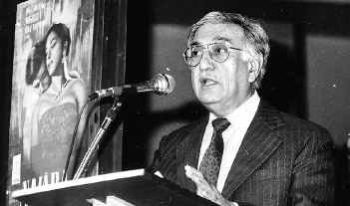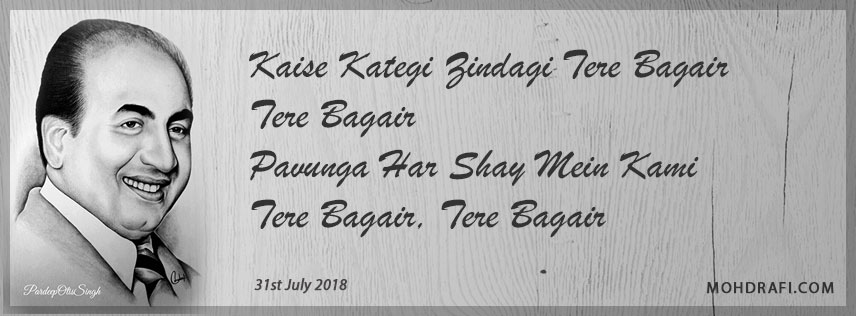A legendary affair with the airwaves
Article by Harsh Kabra for Hindu.com
If radio is the theatre of the mind, then Ameen Sayani is among its most engaging impresarios.”WHAT do you plan to ask?” probes Ameen Sayani in his unmistakable baritone. “If I knew that,” he reasons, “I won’t meander.” With any other 74-year-old radio doyen who has had a legendary affair with the airwaves for the better part of his life – he began when he was seven and is still going strong – that could be a possibility. But for the first citizen of radio entertainment in India, it isn’t just how to talk, but also how much, which matters. Besides his riveting simplicity and spontaneity, that is also what distinguishes him from the others in his trade.

At the recent Promax India Radio Awards ceremony, Sayani was honoured with the Living Legend Award, constituted by FICCI and the India Radio Forum. A radio veteran of over 55,000 programmes and 19,000 commercials – the feat has even made it to the Limca Book of Records – he still resonates with his vintage manner and phrase that made “Binaca Geetmala” an unparalleled radio sensation.
If radio is the theatre of the mind, then Sayani is among its most engaging impresarios who lend to the magic of the medium their own magic of voice and intonation. Sayani was mentored by his elder brother Hameed, himself a noted broadcaster, stage actor, director and producer best known for starting the “Bournvita Quiz Contest” in 1970. Following Hameed’s demise in 1975, Sayani had to fill in for him, primarily because his voice bore an uncanny similarity to his brother’s. “Hameed bhai’s wife would often mistake me for him on the phone,” Sayani recalls.
Beginnings
For Sayani, whose initial Hindi was tinged with Gujarati and English, breaking into Radio Ceylon in 1952 entailed polishing his Hindustani. Even the half-hour “Geetmala” dropped into his lap only because other leading broadcasters declined it. “For all of Rs. 25, I was required to select the songs, produce, script and compere the programme, and also sort the mail. The programme involved a competition and we expected 40-50 letters. The first episode brought 9,000. Within a year, that number touched 60,000. We had to shelve the competition and introduce a countdown show.”
While filling the vacuum left by AIR’s ban on film music in the early 1950s, Radio Ceylon may have little expected to unearth a phenomenon in Sayani. Songs were already popular for adding to the drama in films. Sayani further brought his own brand of drama to these songs. The programme became a rage in no time, drawing nine to 20 crore listeners. “That was the golden period of music,” he reminisces. “Listeners spread all over India and as far away as east Africa enjoyed the music irrespective of whether they understood it.”
From what one heard, it didn’t seem as though this man with an inimitable drawl ever used a script. “But I must confess,” he reveals, “that as someone who began with the AIR where nobody could go on air without a script, I was always tied to one. I had learnt to read in a way that sounded like I was chatting.”
While selecting songs based on record sales and the feedback of radio clubs, Sayani worked hard to ensure his paydaans (ratings) gave a true reflection of their popularity. The featured albums would sell like hot cakes. So HMV even requested a list of songs in advance to replenish the record stocks in time: They couldn’t afford a dip in the sales to mar a song’s fortunes on the popularity charts the subsequent week. Notwithstanding industry efforts to question and sabotage the countdown, Sayani ran the programme to record-smashing success for nearly 45 years, earning a place among the world’s top five broadcasters and the Golden Abby Award for Outstanding Radio Campaign of the Century in 2000.
For Sayani, the radio has never been a medium of absence for any of his roles ranging from a magnificent raconteur to a musical connoisseur. In eliciting flashes of illumination from recorded music, he has become as integral to the history of Indian film music as the music itself, which has always been his reigning passion. “I learned classical music in my young days and would have loved to become a singer, but somewhere in the late 1940s, like all adolescents, I lost my voice.” Music’s loss turned out to be radio’s gain.
Best programme
Sayani rates “Sangeet Ke Sitaron Ki Mehfil”, a series of rare interviews with celebrated singers, music directors and lyricists, interspersed with recent references and a contemporary narrative, as his best programme yet. “I have a 45-year-old library. It took the life out of me to produce this series.” Now syndicated, it is regaling music lovers in the UAE and New Zealand, while Sayani readies to take it elsewhere.
Among Sayani’s regrets is not getting close friends like S.D. Burman, Roshan and Sahir Ludhiyanvi on the tape, as also the painfully shy Mohammad Rafi. “I only have a small piece in which Rafi pays tribute to Burman.” Sayani once came across a Rafi programme recorded abroad with Mehmood, Johnny Whiskey and a local compere. “But even there, Rafi Sahab didn’t go beyond haan, nahi and bahut achha.”
He likes today’s RJs in that they follow a conversational style. What he doesn’t is that they all sound alike. “Every human being has a distinct personality, which must come out in one’s style.” Sayani’s steadfast belief is that no entertainment is complete without social relevance. “I was close to life and, therefore, to the listener.” Radio, he avers, should be free of unnecessary government shackles. But a bureaucratic hangover has been the biggest bane of AIR. “Television didn’t kill radio; radio killed itself. If AIR had looked after itself, there was no question of any other radio coming in.”
Be it the steep licensing fees or the recent Broadcasting Services Regulation Bill, policy continues to be dour for independent radio stations. “We need a system where both the government and such stations prosper,” says Sayani. “Despite the landmark judgement clearing the airwaves of government interference, how can you ask independent FM not to do news and current affairs? Such things only exacerbate the already grave communication crisis. The media must bring about a self-regulation movement like the Advertising Council of India.”
At his studio-office in Cecil Court, an old Colaba building, the septuagenarian still zestfully plugs away with son Rajil at syndicating his series and producing spots and jingles for radio in over a dozen countries. Besides, he is also occupied these days with something more far-reaching: A movement to clarify communications in India. “In all walks of life, religious, social, economic or legal, communication is so confusing that you never know the right path. I have worked out a way to remedy this morass. Unless all of us get together, nothing will be achieved.” Sayani knows he has no dearth of takers for his ideas. All he needs to galvanise them is his endearing “Bahnon aur Bhaiyon” one more time!















I have enjoyed Rafi specially under S. D. Burman. One of the best and beautiful Gazals ‘Kahi Bekhayal Hokar’ that Rafi sang under SDB was on Dev Anand in film “Teen Devian”. One keeps on listening to again and again!
Such was Rafisaab’s comeback into the musical charts 1977 onwards that a scribe wrote a clip as follows:
“The weekly Binaca Geet Malas in 1980 have clearly shown so far that Rafi is dominating, sometimes with as many as 10 songs as compared to Kishore’s two (on May 28) out of a total of 16 toppers!”
Way to go, Rafisaab!
I liked unknow1’s post. But, did he want to say something else? I am just joking!
unknow1 ur right
This site is only for kings(mohdrafi.com)
Jest want to say about Ameen Sayani he is the King of radio